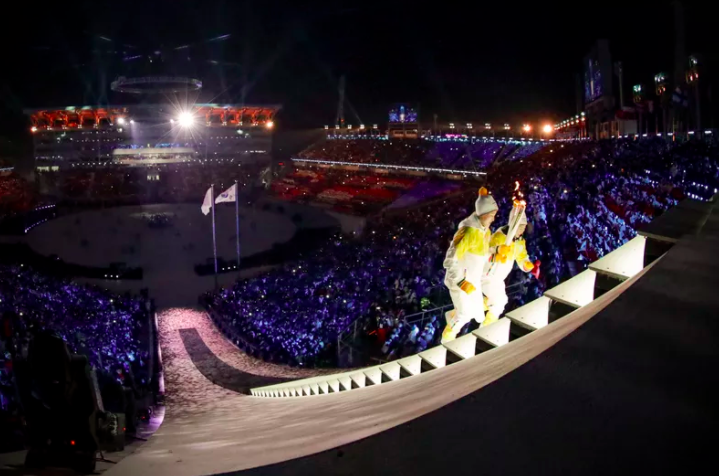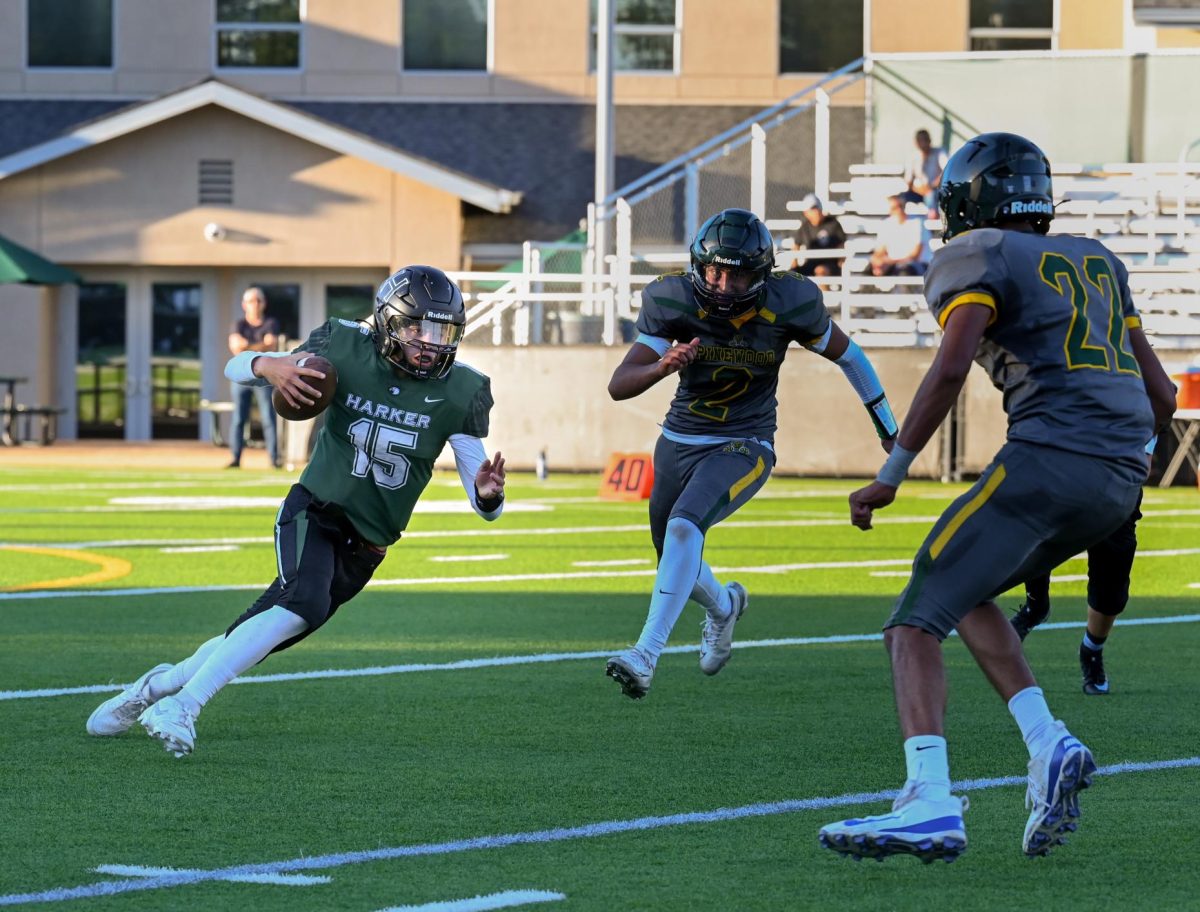North and South Korea reunite through Winter Olympics
Getty Images
North Korea’s Jong Su Hyon and South Korea’s Park Jong-ah light the Olympic Cauldron during the opening ceremony. Unprecedented unification between the two Koreas was seen during the Olympic games.
February 27, 2018
North and South Korea displayed newfound unity through the Winter Olympics, which were held in Pyeongchang, South Korea from Feb. 9 through Feb. 25.
The two countries’ delegations marched under the unified Korean flag, which features a light blue silhouette of the Korean peninsula on a white background. North and South Korean women also formed a unified ice hockey team, although they finished last.
Kim Yo-jong, the sister of Kim Jong Un and the head of North Korea’s propaganda department, attended the opening ceremony of the games. She sat next to United States Vice President Mike Pence, although the two did not interact.
Political and military tensions have been extraordinarily high between South and North Korea due to North Korea’s nuclear program. North Korea now possesses an Intercontinental Ballistic Missile (ICBM), the Hwasong-15, that is capable of theoretically delivering a nuclear warhead 13,000 miles away.
Despite the flaring tensions, Kim Jong Un, the authoritarian leader of North Korea, said he wanted “peaceful resolution” with South Korea and made the initial offer to send a delegation to the Olympics in his New Year’s Day address.
“North Korea’s motives may be suspect, and as the U.S. and Japan claim this may be a mere charm offensive, but I believe any diplomacy is better than no diplomacy,” Joyce Lee, a researcher for the Stanford Korea program, said. “The Olympics offered an opportunity to try diplomacy one more time before any military action is seriously considered.”
South Korean president Moon Jae-in has faced backlash for going too far in trying to amend ties with the harsh authoritarian state of North Korea. However, some experts say that the Olympics present a welcome opportunity to resolve conflict.
“You can’t deal with North Korea as you would with any other normal state,” Lee said. “North Korea is an extremely closed country. No head of state has ever met Kim Jong Un, and so little is known about him and the country as a whole. That’s why we need to take every possible means to bring North Korea back to talks because that’s the only way we will learn about North Korea and to lower the risk of miscalculation about their motives, incentives and goals.”
Additionally, some believe that South Korea was justified in focusing more on the actual games.
“The Olympics was not an opportunity to bring about meaningful change in North Korea, but it was a great opportunity for South Korea to show off,” Honors Modern International Affairs teacher Damon Halback said. “I understand why they decided that was more important than using it to show North Korea’s failures, which are apparent regardless of the Olympics.”
Although the Olympics offered a break from the intense geopolitical fight between North and South Korea, President Trump imposed new sanctions on North Korea that he claims are “the heaviest ever” on Feb. 23, two days before the closing ceremony.
“North Korea has a pretty bad record of being fleeting and deceitful in the past, so it’d be too naive to think that the recent developments will bring a permanent peace to the Korean peninsula,” Lee said. “But, even with that risk, South Korea had no choice but to accept and go inline with North Korea’s peace-oriented attitude to allay the concerns of participating countries about the possibility of a North Korean provocation during the Olympics and to bring North Korea back to the table.”
These Winter Olympics were the largest ever, with 92 countries participating. South Korea won 11 medals, while North Korean athletes were unable to win any. The 2020 Summer Olympics will be held in Tokyo, while the next Winter Olympics will be held in Beijing in 2022.


















![“[Building nerf blasters] became this outlet of creativity for me that hasn't been matched by anything else. The process [of] making a build complete to your desire is such a painstakingly difficult process, but I've had to learn from [the skills needed from] soldering to proper painting. There's so many different options for everything, if you think about it, it exists. The best part is [that] if it doesn't exist, you can build it yourself," Ishaan Parate said.](https://harkeraquila.com/wp-content/uploads/2022/08/DSC_8149-900x604.jpg)




![“When I came into high school, I was ready to be a follower. But DECA was a game changer for me. It helped me overcome my fear of public speaking, and it's played such a major role in who I've become today. To be able to successfully lead a chapter of 150 students, an officer team and be one of the upperclassmen I once really admired is something I'm [really] proud of,” Anvitha Tummala ('21) said.](https://harkeraquila.com/wp-content/uploads/2021/07/Screen-Shot-2021-07-25-at-9.50.05-AM-900x594.png)







![“I think getting up in the morning and having a sense of purpose [is exciting]. I think without a certain amount of drive, life is kind of obsolete and mundane, and I think having that every single day is what makes each day unique and kind of makes life exciting,” Neymika Jain (12) said.](https://harkeraquila.com/wp-content/uploads/2017/06/Screen-Shot-2017-06-03-at-4.54.16-PM.png)








![“My slogan is ‘slow feet, don’t eat, and I’m hungry.’ You need to run fast to get where you are–you aren't going to get those championships if you aren't fast,” Angel Cervantes (12) said. “I want to do well in school on my tests and in track and win championships for my team. I live by that, [and] I can do that anywhere: in the classroom or on the field.”](https://harkeraquila.com/wp-content/uploads/2018/06/DSC5146-900x601.jpg)
![“[Volleyball has] taught me how to fall correctly, and another thing it taught is that you don’t have to be the best at something to be good at it. If you just hit the ball in a smart way, then it still scores points and you’re good at it. You could be a background player and still make a much bigger impact on the team than you would think,” Anya Gert (’20) said.](https://harkeraquila.com/wp-content/uploads/2020/06/AnnaGert_JinTuan_HoHPhotoEdited-600x900.jpeg)

![“I'm not nearly there yet, but [my confidence has] definitely been getting better since I was pretty shy and timid coming into Harker my freshman year. I know that there's a lot of people that are really confident in what they do, and I really admire them. Everyone's so driven and that has really pushed me to kind of try to find my own place in high school and be more confident,” Alyssa Huang (’20) said.](https://harkeraquila.com/wp-content/uploads/2020/06/AlyssaHuang_EmilyChen_HoHPhoto-900x749.jpeg)









